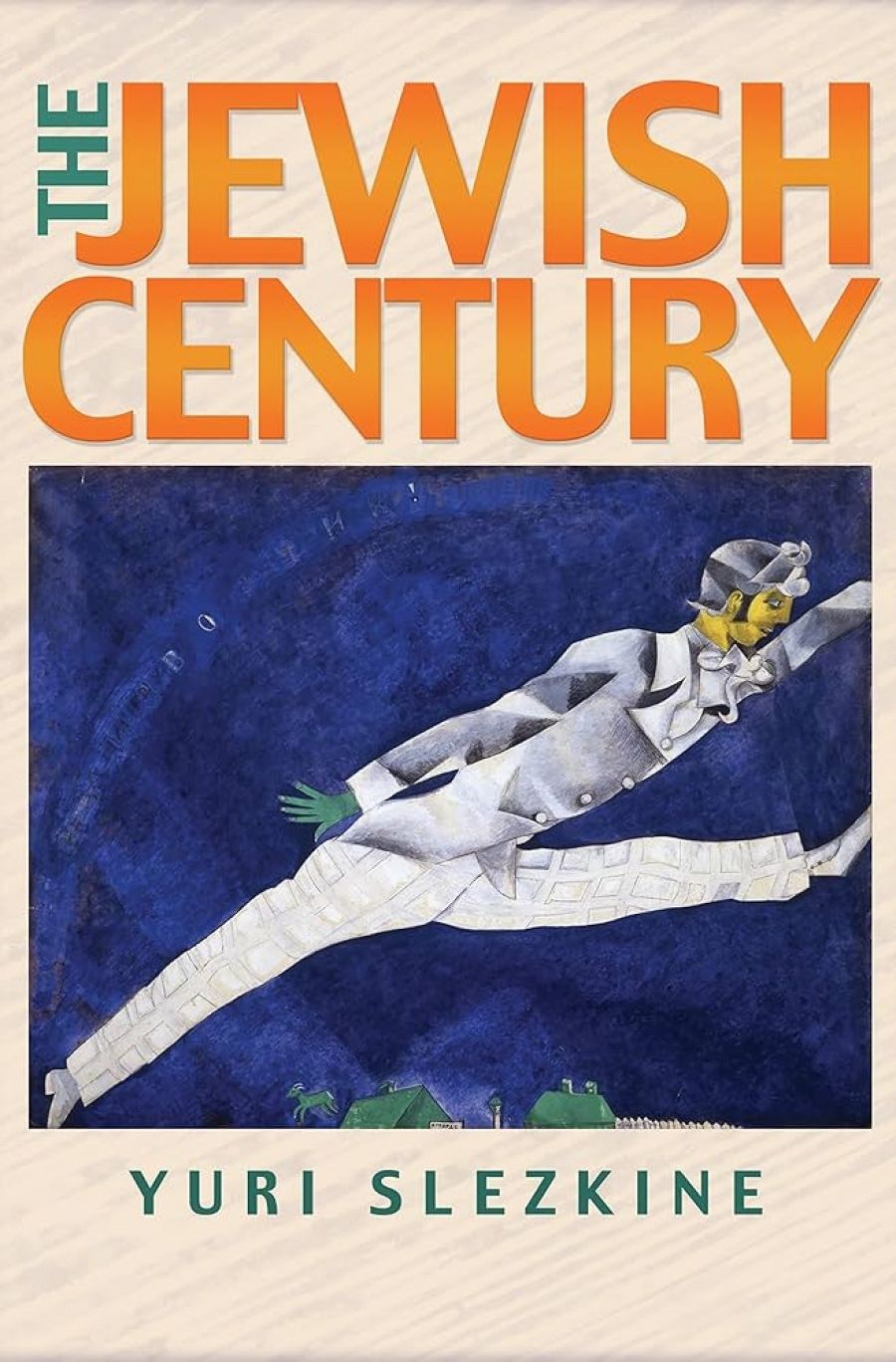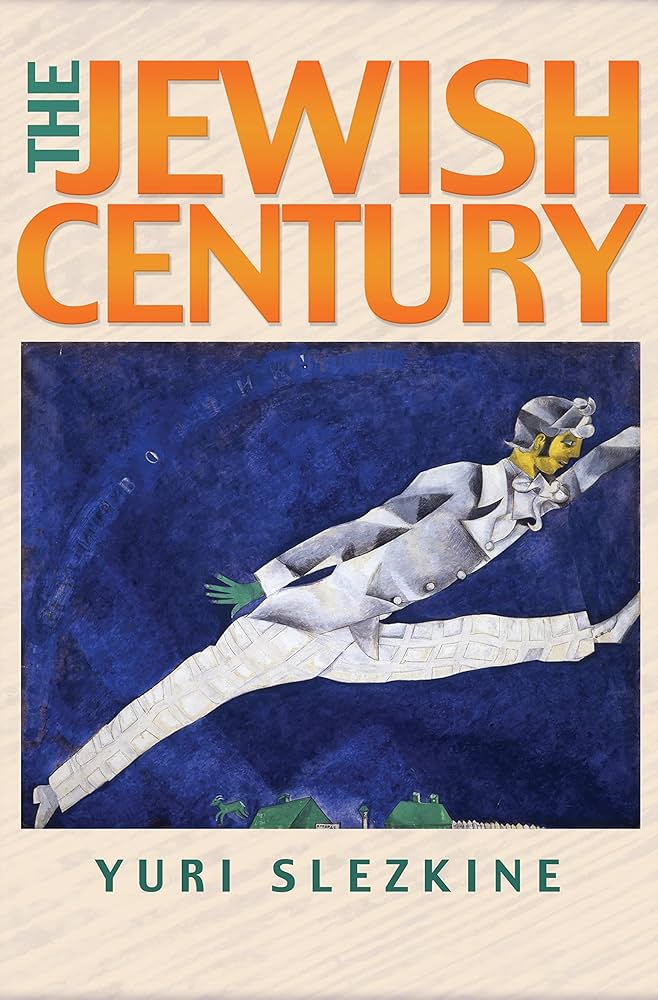
- Free Article: No
- Contents Category: History
- Review Article: Yes
- Article Title: Mercurians and Apollonians
- Online Only: No
- Custom Highlight Text:
Fortunately, only a part of this book (the inferior part) attempts to take on the impossible task implied by its title and first sentence: the task of explaining how, or whether, the Modern Age is the Jewish Age. Nor, to its credit, does the book try to smother its failure in irony. It really means to take this task on. When it does so, particularly in the opening chapters, it lapses into obscurity and metaphor. The topic is too large for the author and is bound to escape him.
- Book 1 Title: The Jewish Century
- Book 1 Biblio: Princeton University Press, $62.95 hb, 438 pp
- Book 1 Cover Small (400 x 600):

- Book 1 Cover (800 x 1200):

Yuri Slezkine, a professor of modern Russian history at the University of California, Berkeley, tries to make the job easier for himself by introducing two categories – Mercurians and Apollonians – that are supposed to describe the differences between stateless minorities such as the Jews and their less wily host nations. The Mercurians, says Slezkine, ‘use words, concepts, money, emotions’; they are transient, literate, superior and cunning, and they ‘lived by their wit, craft and art’. The Apollonians, in contrast, use tools and products; they are settled, moody, dignified and athletic; they are ‘now sober and serene, now drunk and frenzied’.
The distinction is neat and occasionally curious but – stretched as it is in this book to convey a century’s worth of social and ideological developments – it becomes strained and confusing. Slezkine creates and marshals his dual categories to try to show that Jewish characteristics and phenomena are not, or need not be, unique. But the assignment forces him to reduce history to generalisations and to describe all movements and people as seen through his interpretative bifocals. The result is chaotic, one-dimensional and confusing. And, as it turns out, the lenses were unnecessary.
In the second half of the book, Slezkine moves to a more concrete subject that is less in need of reduction: the role of the Jews in the Russian Revolution. Judging by the book’s one-paragraph biographical preface, it is possible that this is really all Slezkine wanted to talk about in the first place. As Slezkine explains (and the explanation is vital), he grew up in the Soviet Union, with his two beloved grand-mothers. One was born to a gentry family, was proud of her Cossack ancestors, and lost everything in the revolution. The other was born in the Pale of Settlement, was proud of her Jewish ancestors, went to prison as a communist and later took part in the building of socialism.
It is little wonder, then, that Slezkine wanted to trace the Jewish century as an age divided between Apollonians and Mercurians. For the stories of his two grandmothers, one Apollonian and one Mercurian, begin to tell the story of twentieth-century Russia. As far as his book is concerned, and remembering the author’s chosen field at Berkeley, the better-told tale is not the Jewish century but Slezkine’s century.
Indeed, much of the discussion of the impact of Russian Jews on their nation’s history focuses on their frequently radical responses to the values and beliefs of their parents and grandparents. This is told through the biographies, memoirs, poetry and stories of a range of people, including the novelist Isaak Babel, the Zionist leader Vladimir Jabotinsky, and the poets Osip Mandelstram and Eduard Bagritsky. Both Babel and Mandelstram, for instance, remembered their grandmothers as pushy, stubborn and determined to encourage their offspring to conquer the world from within the confines of the study and the shtetl. ‘Study and you will achieve everything – wealth and fame,’ Babel’s grandmother tells him, before adding, ‘Don’t trust people. Don’t have any friends.’ Babel, war correspondent and famous author, achieved his success in spite of the advice. ‘What matters,’ as Slezkine says, ‘is not whether Babel’s grandmother really said anything of the sort; what matters is how Babel, Mandelstram, and so many others remembered their grandmothers.’
This urgent craving to escape the shtetl and to revolt against the family continued as anti-Semitism swelled in the late nineteenth century, resulting in a mass exodus of Russian Jews. The revolutionary nationalists went to build a secular, socialist Palestine (to transform themselves into Apollonians, in the author’s parlance), and the less radical went to the US where they could forge an earthly utopia without forsaking their professions or their memories of the shtetl. But the largest and least celebrated migration was internal, from the Pale of Settlement to Moscow, Leningrad, Kharkov and Kiev. America was a compromise and Palestine was a dream, but the Soviet state was the emerging and real Promised Land. Freed from the Pale of Settlement, the Jews flocked to the larger cities to help build the Soviet state. With their high rates of literacy, their lust for learning and their desperate desire to build a utopia unrecognisable to their parents, they emerged as the core of the Soviet cultural and political élite. They became poets, philosophers, politicians, academics, military commanders and bureaucrats. They headed the secret police and the Gulag. They channelled History and escaped the past. And when they became parents, their children – the ‘first fully Soviet generation’ – no longer inherited a lust to rebel because ‘their parents had done it once and for all’.
It was an ennobling period for these exiles from the shtetl, though it lasted little more than a generation. By the end of the 1940s, the tolerant internationalism of the revolution had been supplanted by Russian nationalism and Stalinist paranoia. The Soviet enterprise was becoming more Russian, and the Jews were becoming less Soviet. The Holocaust suggested to many Jews that their Jewishness was not something they could escape, while the subsequent formation of Israel suggested that they – like every other non-Russian ethnic minority – could lay claim to a state.
As their distinctiveness translated into discrimination, individual Jews became more aware and protective of their status as a separate ethnic group. The common past that they had sought to escape now appeared to contain the seeds of a shared future. They began to remember and respect their grandparents. When Israel’s first ambassador to Russia, Golda Meyerson (later Meir), visited a synagogue in Moscow to celebrate the Rosh Hashanah festival in 1948, she found herself surrounded by thousands of Jews who – risking prosecution – surrounded her and cried ‘Shalom’. These were the same people who had flocked to the cities to lose their ethnicity and build the communist state. By the 1960s, as affirmative action programmes limited work and study opportunities, the Jews were clamouring to leave. Some had rediscovered their nationhood and desired a homeland in Israel; others had had nationhood forced upon them and craved a home of their own in liberal America. Between 1968 and 1994, as emigration restrictions were removed, about 1.2 million left, primarily for the US and Israel.
Slezkine resists the temptation to link the loss of the Jewish intelligentsia with the fall of the Soviet Union. In any case, the story of the Jews in communist Russia tells its own tale about the ruptures in ideology and the decline of meritocracy in the state’s final years. It also reinstates a forgotten and vital episode of recent history. The prominence of Jews today is at least partly due to their disproportionate prominence amongst the entrepreneurs, artists, professionals and political class in the world’s richest and only superpower. It is a prominence that had a precedent. When the Jews were allowed to be Soviets, they joined the revolution – for a common future untied to their parents or their past – and thrived. But, as they became disentangled and rejected from the Soviet enterprise, the Jews found themselves reunited with discrimination and constraints. And so they left.


Comments powered by CComment